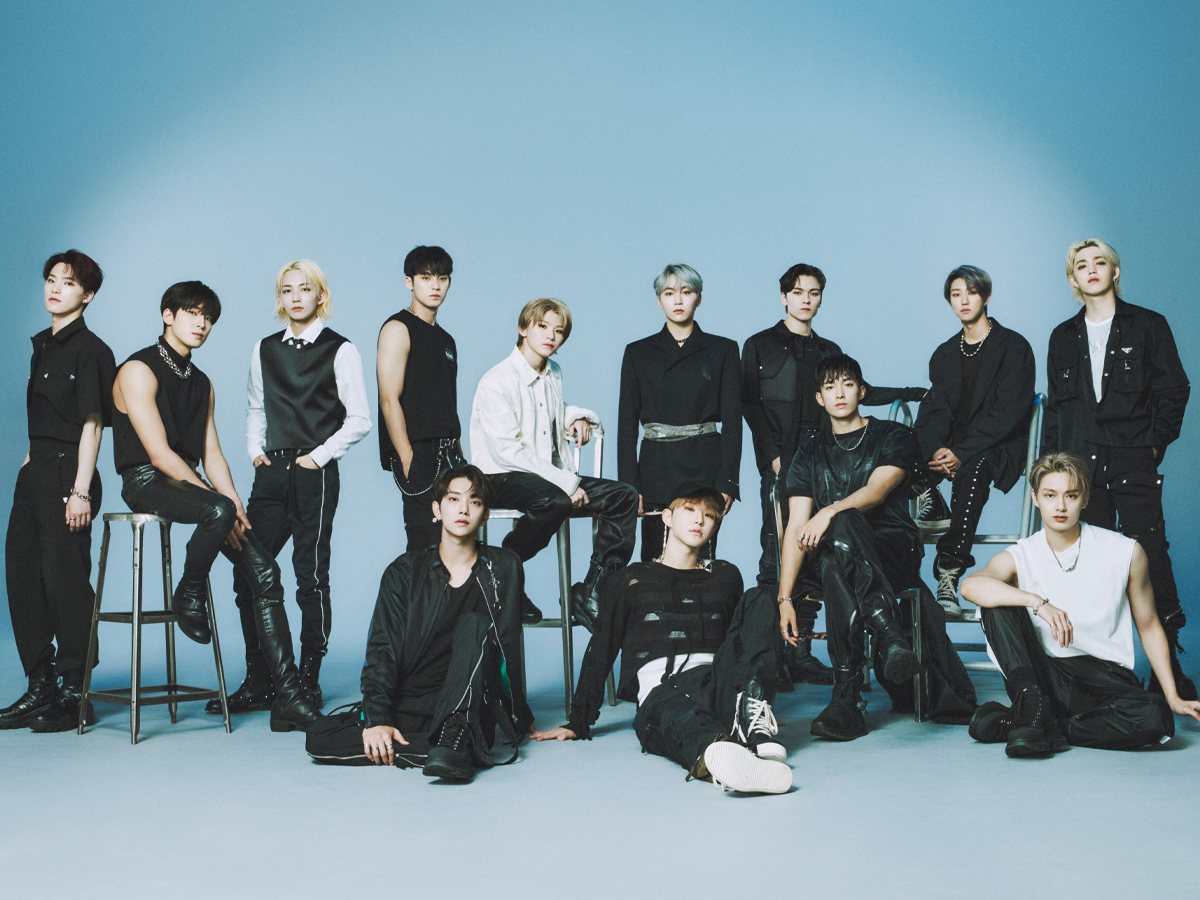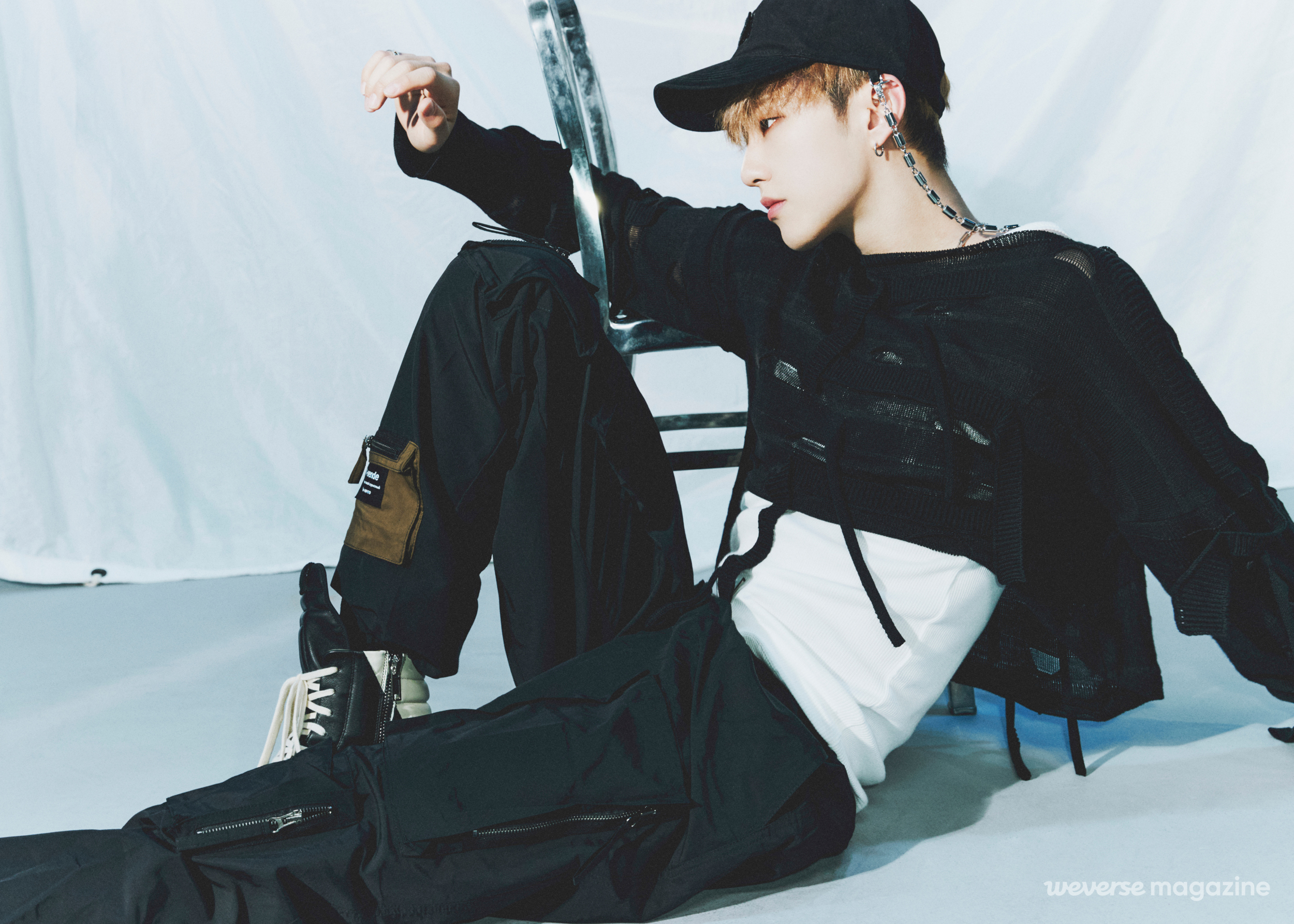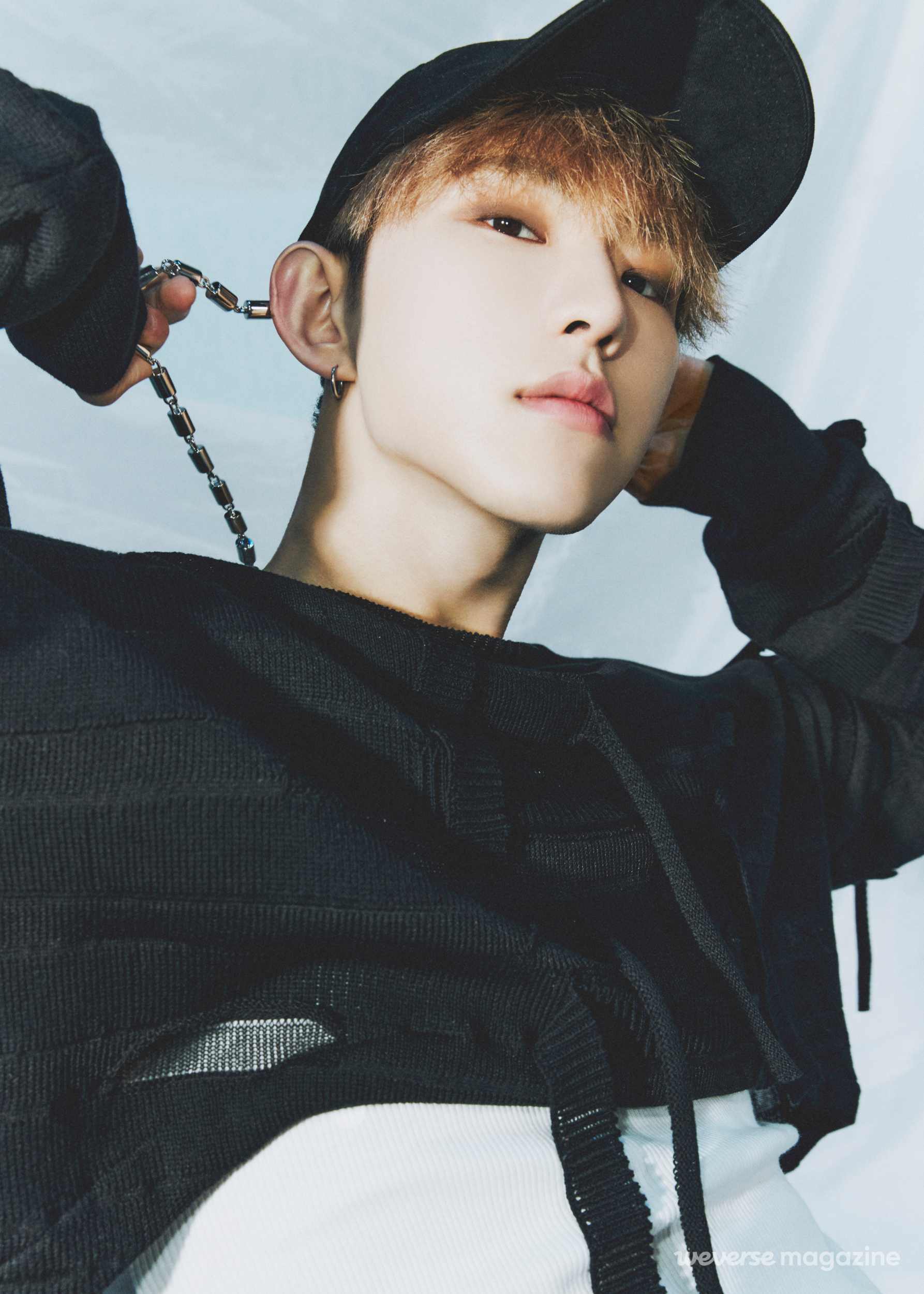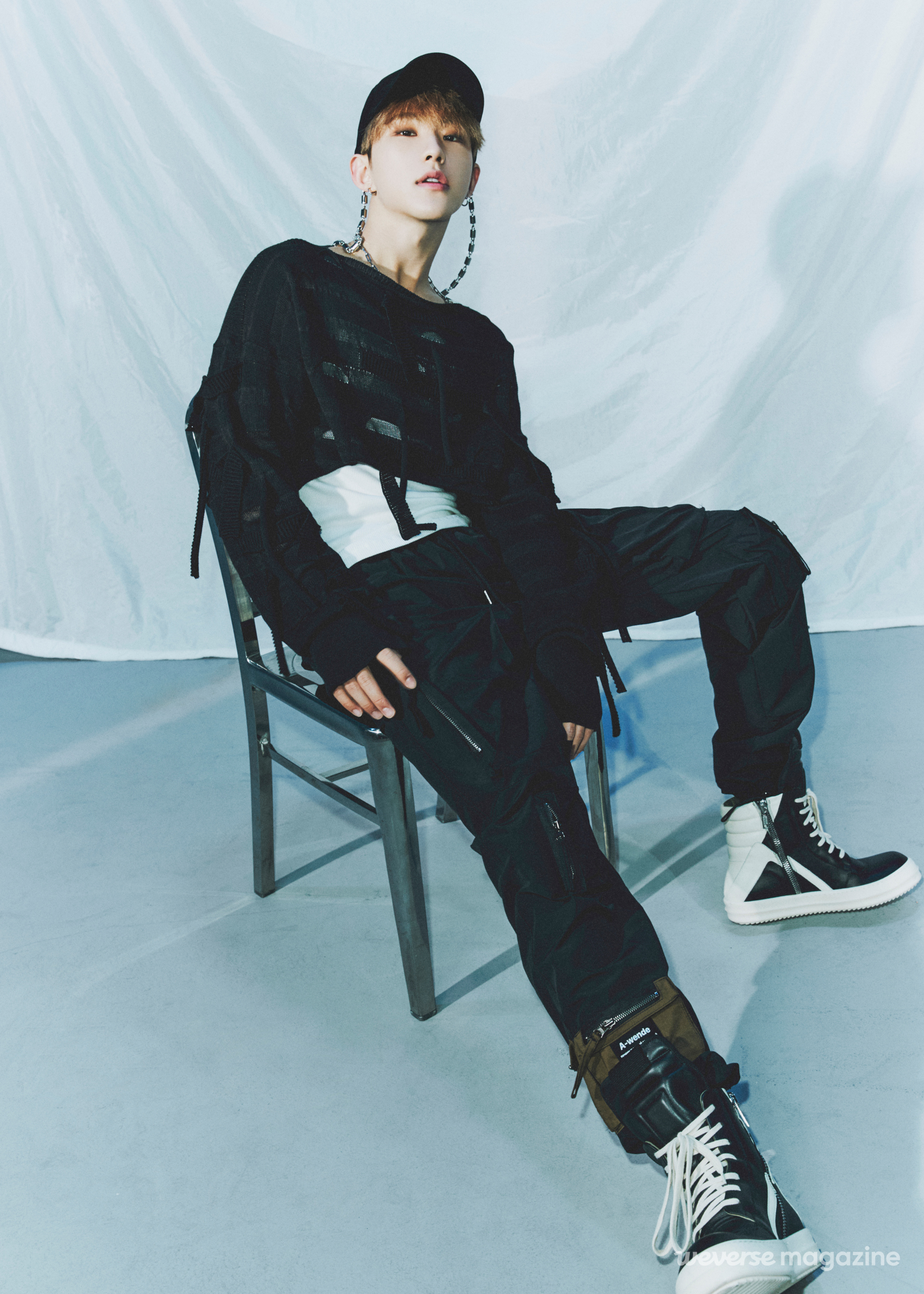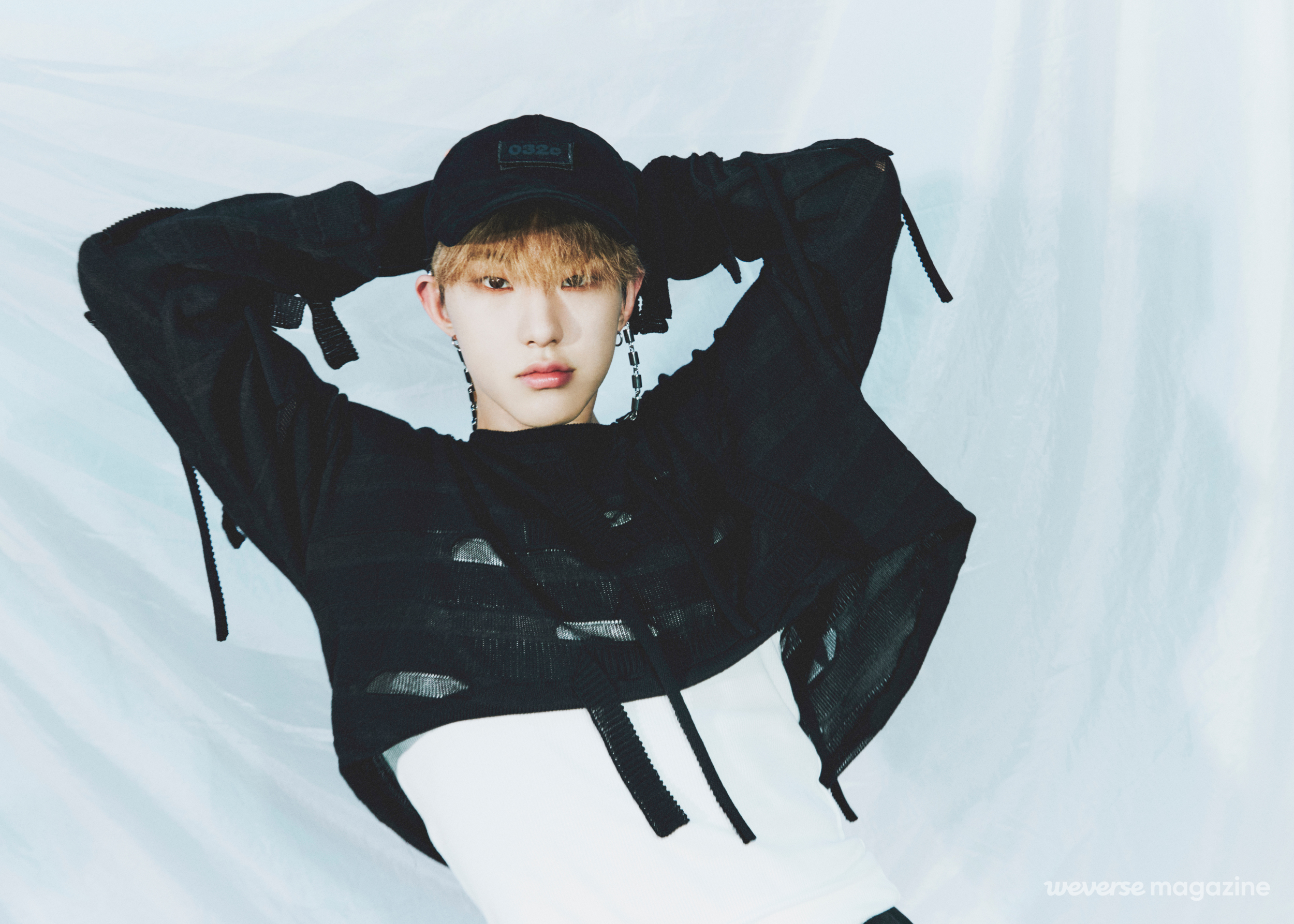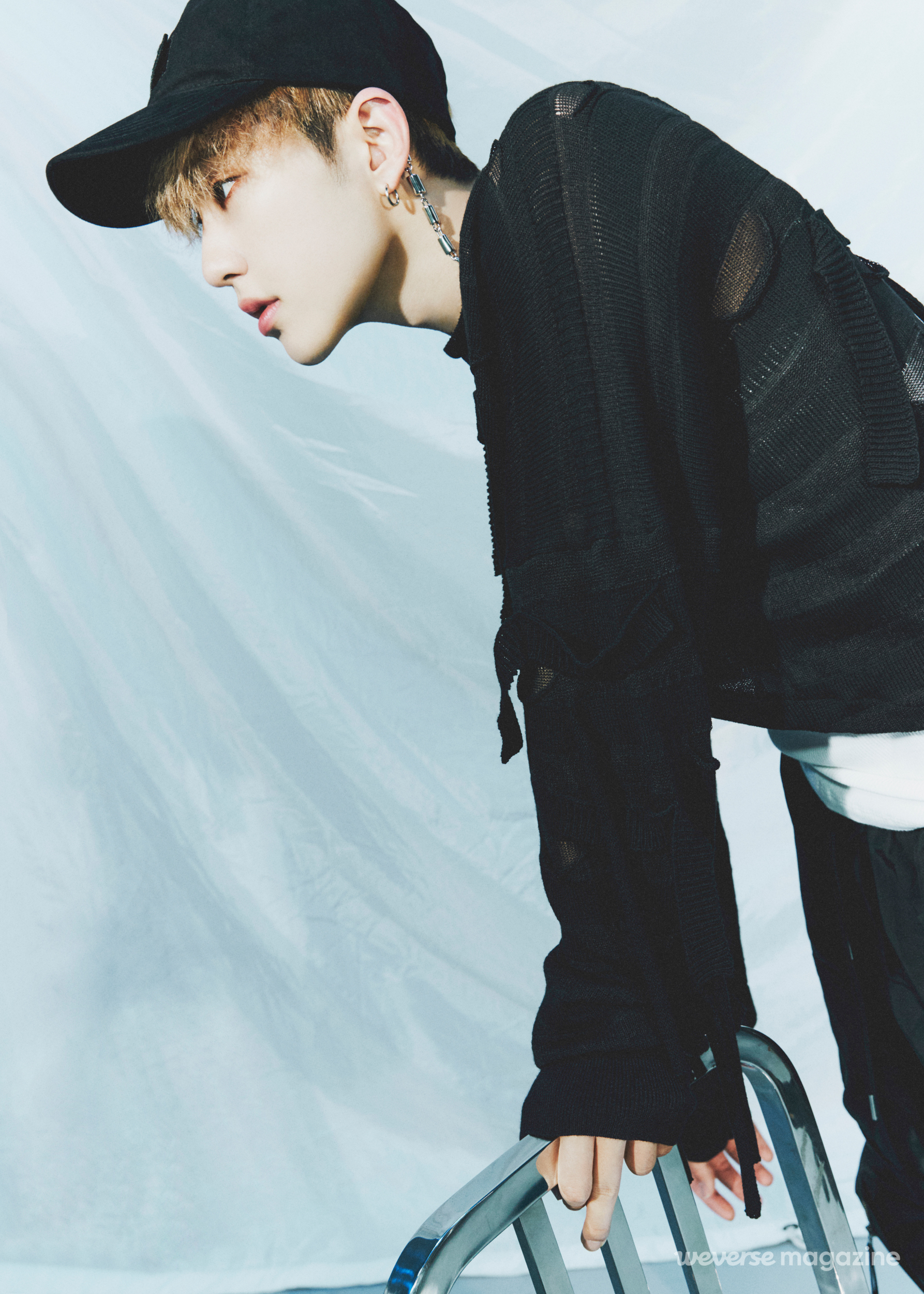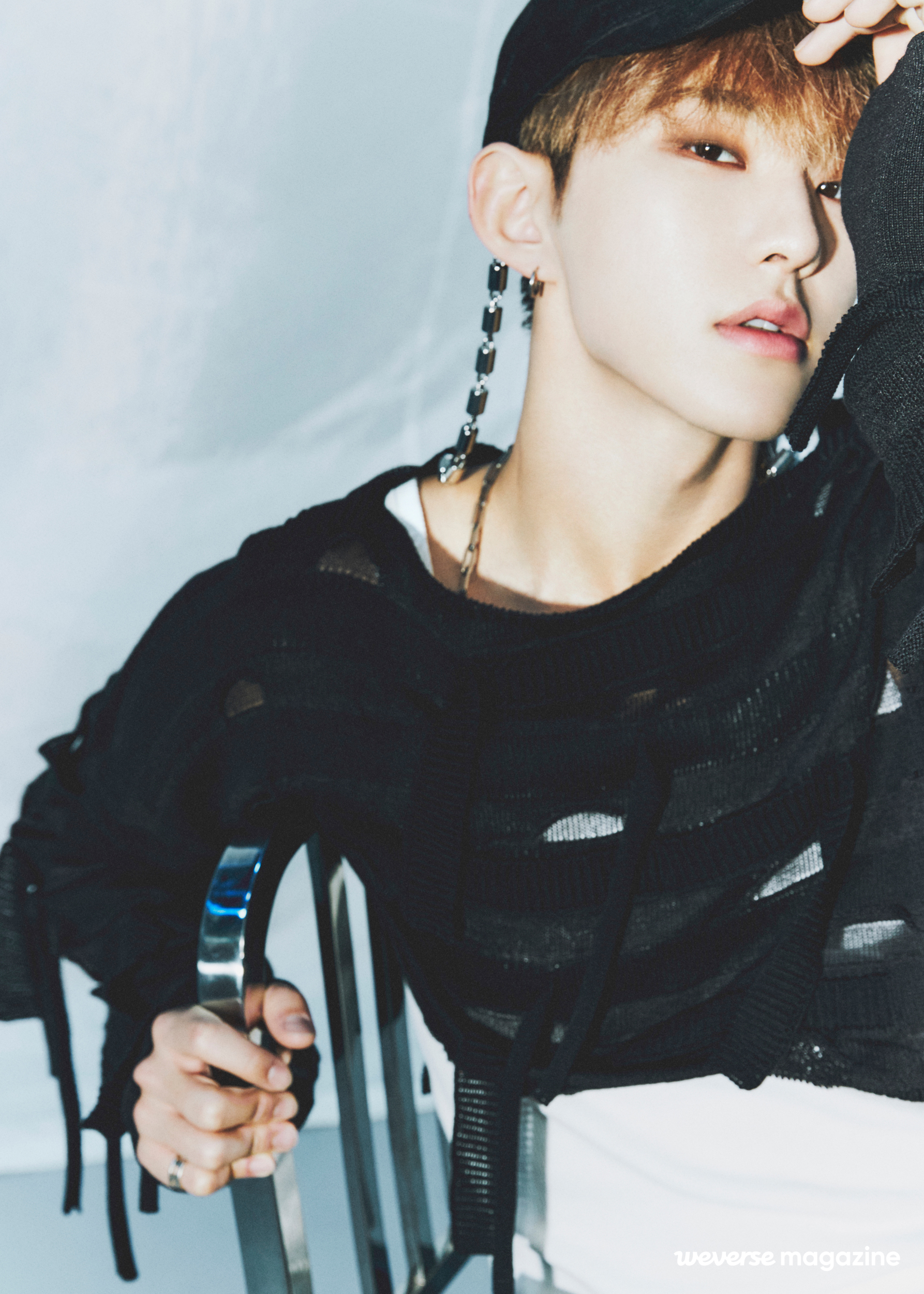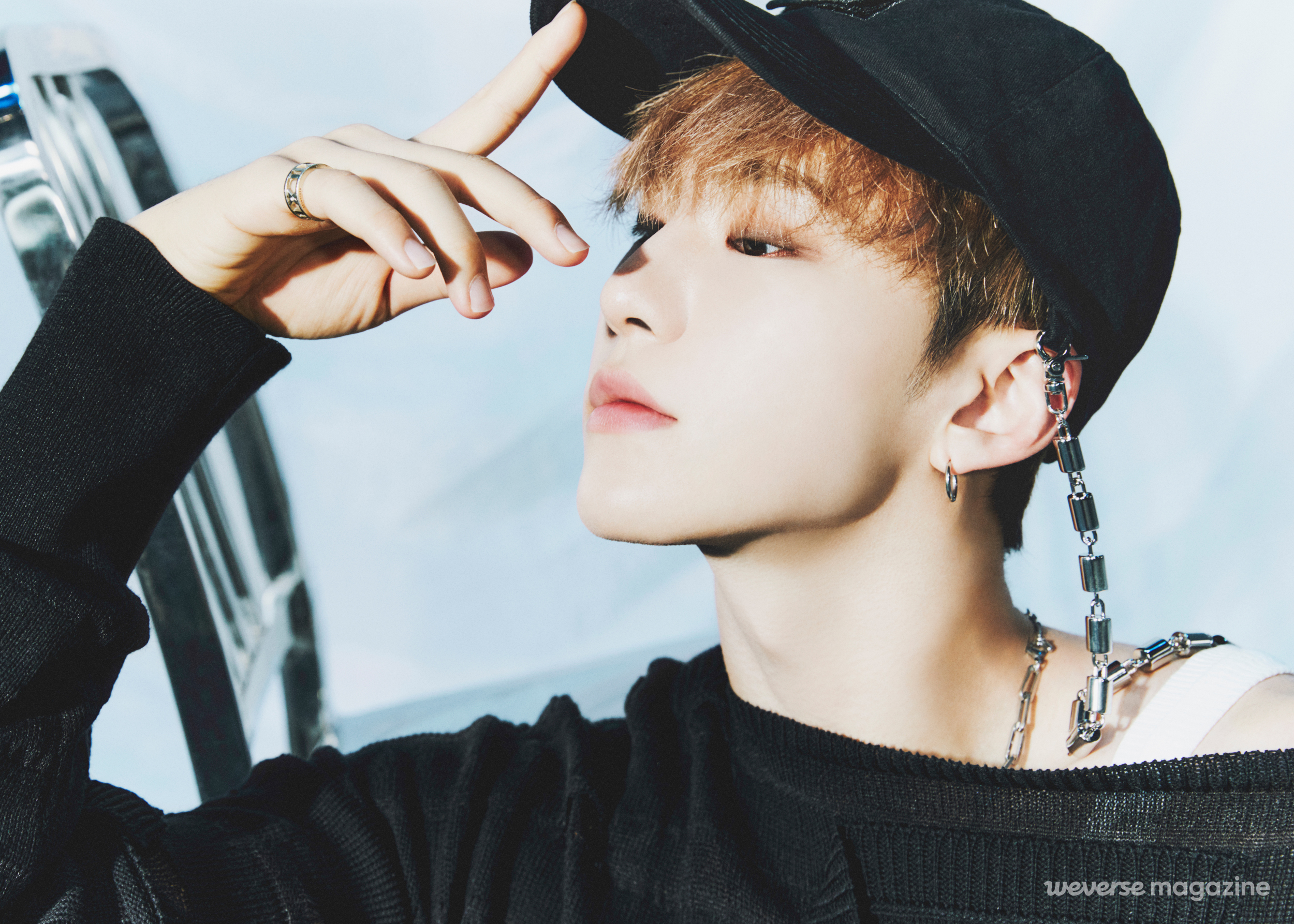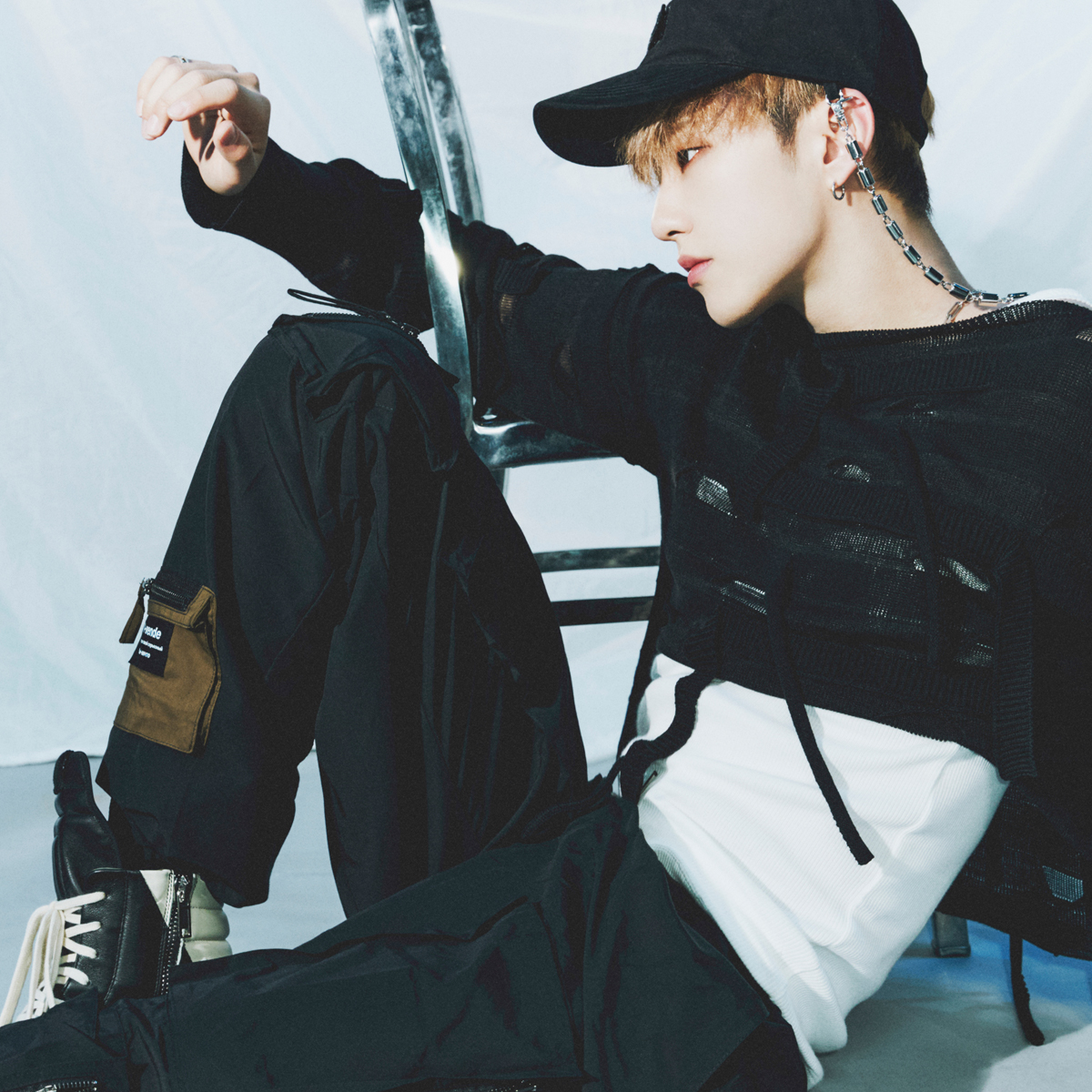
HOSHI was absorbed in his music while waiting around for the photoshoot, rapping the whole time. And his enthusiasm was real: “I follow the beating of my heart.”
You brazenly posted to Weverse lately how you snuck off with S.COUPS’ shoes and hat. Did you give them back? (laughs)
HOSHI: I gave back the hat, but I still have his shoes. (laughs) What happened was, his shoes were sitting in the gym we go to for almost a year! They’re expensive shoes, too. It’s such a waste for them to just be sitting there. I feel like—I rescued those shoes? So I’m taking good care of them for now. (laughs)
That incident led to a making-of V LIVE of the “Seungcheol’s Hat” rap. (laughs) It started out as something you did on a whim but you quickly fell in love with the idea and even wrote some lyrics.
HOSHI: That’s how it goes when I write lyrics. (laughs) I become immersed as soon as I start and I keep working away at it until I’m satisfied. I don’t write the whole thing and then go back and edit it; I write one line, mess around with it until I’m satisfied, then move onto the next one. I’m always deep into my phone like this (buries face in phone) whenever I’m moving between places or waiting around. I write a lot of lyrics in my notes app, and if any good ideas for a performance or something I want to try come to me, I always take them all down.
WOOZI took your ideas in the middle of it to make a beat for you. Was that similar to how you two normally work together?
HOSHI: Yes. There’s a lot of songs that came out of me spontaneously asking WOOZI to do something in the studio and then he hammered away at them. We usually talk a lot about music when we’re going somewhere in the car. But when we talk about music, it’s usually more like, Hey, isn’t this great? We talk about what we like. I feel so blessed to have a hit songwriter beside me (laughs) and that he knows me so well. I rely on him a lot, both musically and personally.
The performance team worked together with WOOZI on “Wave,” off the new album. What did you want this song to show off about the performance team?
HOSHI: When I heard the track, I jokingly said, “Should we call this song ‘Wave’?” But it really did end up being called “Wave.” I started with the word “wave” as the core idea, and developed it to have more of a focus on myself escaping from the busyness of everyday life—like it’s passing by as you ride a wave. The idea for the song originally came to me as a performance. Minghao wanted to do something other than an airtight group dance routine, so I said, “Alright, let’s make a dance that isn’t only about movement but also about feeling.” I wanted it to seem like our souls are dancing. Actually, you could just move your shoulders and call that a dance. I mean, I think this (making intense, elaborate motions) isn’t the only kind of dance; this (moving rhythmically from side to side) is a kind of dance, too. We wondered if we’d become sort of stuck in the same routine, and then we decided to make a deep house song that would let us put on a new kind of performance. I want this dance to show that we’re in control of our own image—that we’re not restricted to just the one performance angle we usually did.
This new approach to performing reflects SEVENTEEN’s growth as a team, it seems.
HOSHI: You could pick any topic and you have a different perspective now than when you were younger. I feel like the SEVENTEEN we are today comes from all the growing and changing we’ve done. I always wondered what the trendiest music is, but trends change so fast that there’s no one answer. So I decided it’s best not to think about trends and just do what you want to do and be sincere about it. Obviously, trendy music and concepts and things like that are important, but if that’s all you’re aiming for, you’re limiting yourself and you’ll lose sight of your goal. So we want to be able to use our albums as a way to share stories that are appropriate for our age, and which capture our current vibe the best. SEVENTEEN’s new albums have always been that way, and our next album will be something new, too. Because we’ll be a new SEVENTEEN then, too.
The love you show in the single “Ready to love” seems to reflect that change in particular.
HOSHI: Yes, it does. We started out during our debut as these fresh-faced young boys with no idea about love yet and no idea what to do. That’s how we came across. We didn’t know much about love back then—we were just overflowing with energy. But now we’ve received so much love from CARAT, and we want to show that we’re more mature and ready for love in all its various forms and meanings. I think it’s natural our choreography would change to suit us SEVENTEEN members as we enter our mid-20s. Unlike the routines and moves we’ve done before, we focused on loosening up a bit, but in a way that doesn’t take away from the choreography.
Wasn’t it hard for the members to collaborate together on the choreography when everyone’s trying to paint one big picture through their own actions?
HOSHI: We’ve been working together for so long and we all know each other so well that any choreography we do ends up working really well. It’s at the point where we move so well that, for example, when we’re doing a symmetrical dance, if the people on the right rise up, the people on the left naturally just know to move in the same way to match it symmetrically. Our closeness is reflected in our choreography, I think because of just how close we are to each other. Our teamwork is seriously always great, exactly like that. It’s just like that, honestly: We practice hard and nothing else.
You mentioned that you discovered many vocal styles within yourself and you improved a lot while receiving vocal direction for your solo mixtape “Spider.” Did you also feel an improvement to that effect when you were recording this new song?
HOSHI: After recording the whole song from beginning to end, I heard from the engineers a lot that my vocals got better. They said I really made the song sound good and really pop. Actually, I was working on my solo songs in a relaxed atmosphere even before I started to work on “Spider.” Back then Kyu Hoon from SOULSTAR directed my recordings, which were basically vocal lessons. I would continuously record, learn, revise more and sing again, on repeat, and that made my voice stronger. I wasn’t very good at falsetto before, but I improved a lot. I ended up learning how to recognize exactly how to sing certain parts. There’s a part in one of the verses of the new song that goes, “First time feeling my heart race.” The song has to do a complete twist and become more rhythmic at that part, so when it was my turn I put some strength into it. I sang it with more breath and broke up the word, like, “Fuh-hirst.” The chorus at the end and the dancing both blow up at the same time so I made my voice ring out like a bell.
You said you wanted “Spider” to show people what makes you the leader of SEVENTEEN’s performance team. I guess this means you feel responsible toward SEVENTEEN even when you’re doing solo projects.
HOSHI: I think all the members probably feel the same way. My love for the team is so immense that it was a no-brainer. When I came back to the group after working on my solo stuff, I could really feel the stability that all the other members provide. I felt all the more grateful for the work we do as a team when I realized how much the members had energized me during that time. We basically have to spend all day anytime we do anything because there’s so many of us. After shooting, we have to practice, too, which leaves us without a break in our schedule, so we’re obviously worn down and exhausted, but we always say, Fighting! Just a little bit more to go! And that way we can really encourage each other and cheer each other up.
I imagine “Spider” has had a notable influence on your career and your mindset in many different ways.
HOSHI: Definitely. “Spider” was a very conceptual song, and I even used pull-up bars in the choreography, and I’m already busy thinking, If I were to make another mixtape, what kind of song should I make? And what about the next time, after that? I’m also thinking about what to do with the group. What would be the best kind of music for SEVENTEEN? What ideas have I got for a performance? I’m looking for ideas.
Seeing as SEVENTEEN has tried so many different things, you must spend a lot of time thinking about how to continually show new sides of the group.
HOSHI: It’s always been a concern, but maybe even more so now. We’ve been releasing music for six years—there’s nothing we haven’t done. So I have to come up with new ideas, but it’s a little difficult these days. It felt like I hit my limit. Sometimes I think, Am I not imaginative enough? (laughs) Or when I think, What if I’m falling behind? That’s when I know it’s time to really look at myself. I feel like I need to learn more, so I’m trying to broaden my horizons, but it’s not easy.
I can tell how sincere you are about music and performing.
HOSHI: I always want to put on performances I can be proud of. I want to wear the clothes that suit me best, metaphorically speaking. So I kept trying to write songs and things while thinking about what I’m good at, but after trying to write, the toplines came out sounding unoriginal. Everyone has their own talents, of course. So, while I can write songs, I don’t think the ones I write are always what I’m looking for. I can’t just write something and feel proud about it; I have to keep a critical eye and open mind. In the end, I realized I’m a performer and a singer, and I felt a little more certain that I should focus on developing the skills I have that I’m good at. I’ll map out the kind of music I want to do, explain it in detail to the songwriter and the producer, and when the song’s ready I’ll write the lyrics and work on the performance and staging. I think that’s the best fit for me. Performing on stage is what I do best; then there’s WOOZI and a lot of other composers who are great at writing songs. So I can really focus, thinking about the music I want to make and the performances, and collaborate with others for the rest.
You always say music and dance are your only hobbies. How do you feel about doing your hobbies for a living?
HOSHI: The euphoria, you know—it’s exquisite. (laughs) It makes my songs and performances feel so precious to me. What I really like is being on stage. The energy CARAT give me when we’re there—it’s just unreal, honestly. It’s not hard to perform, even for three hours straight. I hear them screaming, I feel their love—and the way they look at me! I never want to let them down. When I’m on stage, I even think, This is exhausting, but I could die happy here. Seriously. When we were playing a concert in the Saitama Super Arena, and I was on a lift, going up, I got goosebumps all the way down to my fingertips. That was a first. Wow. How am I supposed to hold in all this excitement? How do I channel this energy? I remember feeling so happy.
If you love performing that much, you must have felt a real sense of loss when you weren’t able to.
HOSHI: I used to think I don’t really feel my own pain very much, but—wow. That was the first time I ever felt empty. That was back when I was keeping myself busy and preparing for the DOME tour, but everything got cancelled and now I couldn’t do what I like to do most. I felt so lonely. I felt really bad. I was having trouble sleeping at the time, so I wrote a lot of lyrics and worked on a lot of songs. I think making songs with my thoughts and feelings helped me overcome it little by little. Before that I was just going around without thinking too much about what I was doing, but now I had time to look back and think about myself, and look at my feelings more honestly. It was interesting, being able to write down all the things I could never say before because I was too embarrassed. But that empty feeling didn’t last, and when I worked on my solo projects and got ready for the SEVENTEEN album, I was back to living a fast-paced life. (laughs)
You said that you changed a lot after CARAT came into your life. In what way did you change?
HOSHI: I feel a lot more responsible now. When we first debuted, I liked being popular and being loved and didn’t give it much thought, but the more time goes by, the more I realize how much that means to me. CARAT’s love has also made me take responsibility for my attitude and my behavior. I think they’re steering me down the right path. The reason I never give up and keep working hard is because I want to be a great singer for CARAT. I mean, I would hate to give a performance I’d be ashamed of.
No matter what we’re talking about, you always bring it back around to performing.
HOSHI: I hope that when CARAT go around saying, “We’re CARAT,” that they’ll feel really proud. They’re the reason I want to give a performance I can be proud of.
Unauthorized reproduction and distribution prohibited.
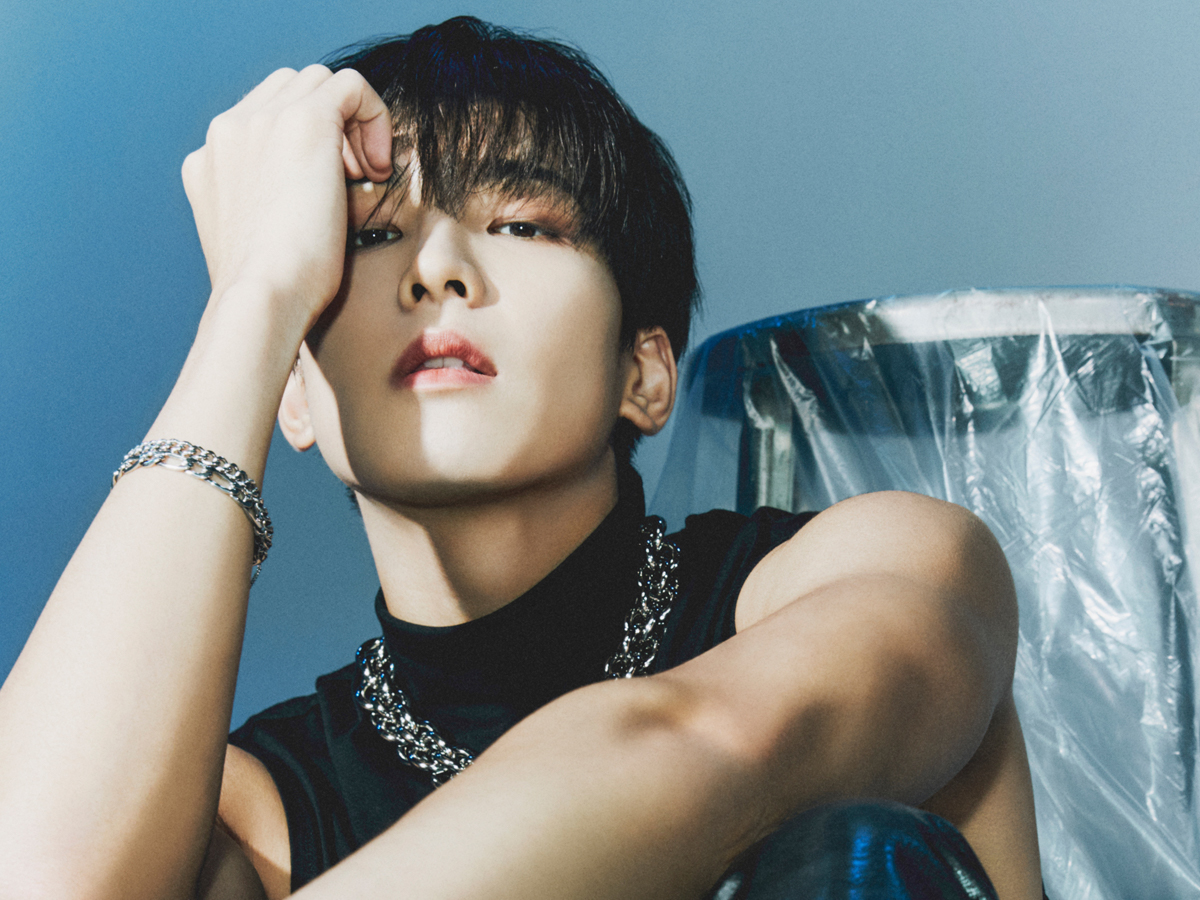
- DK: “I just want to believe in myself”2021.06.22
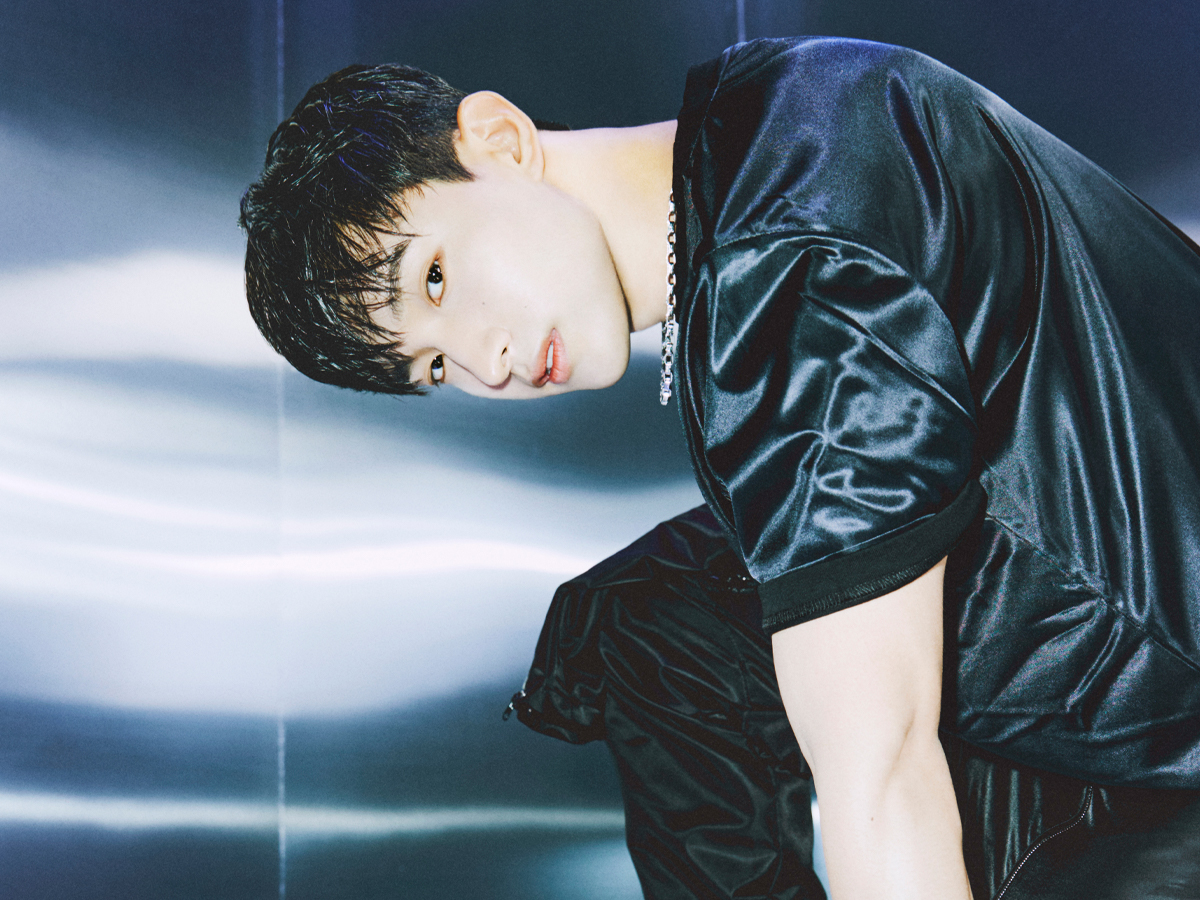
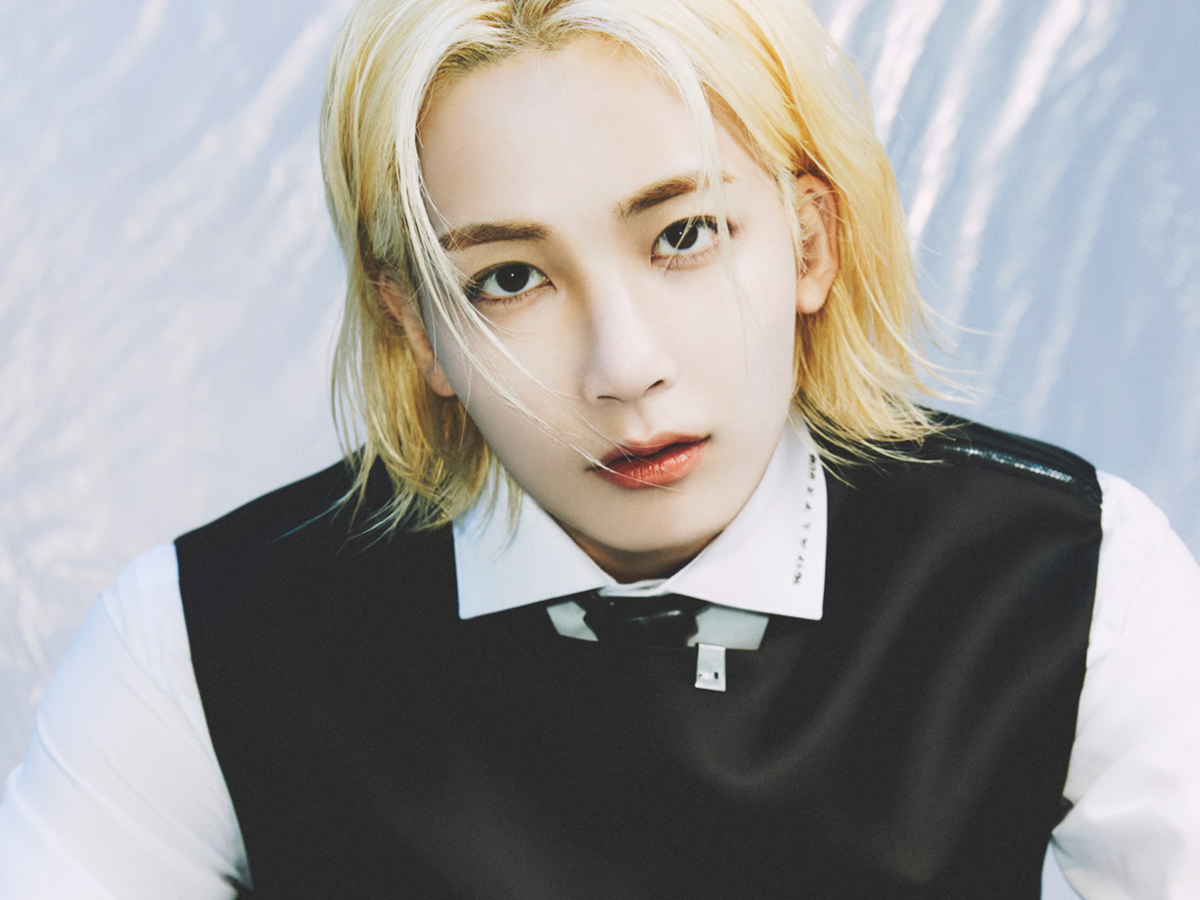
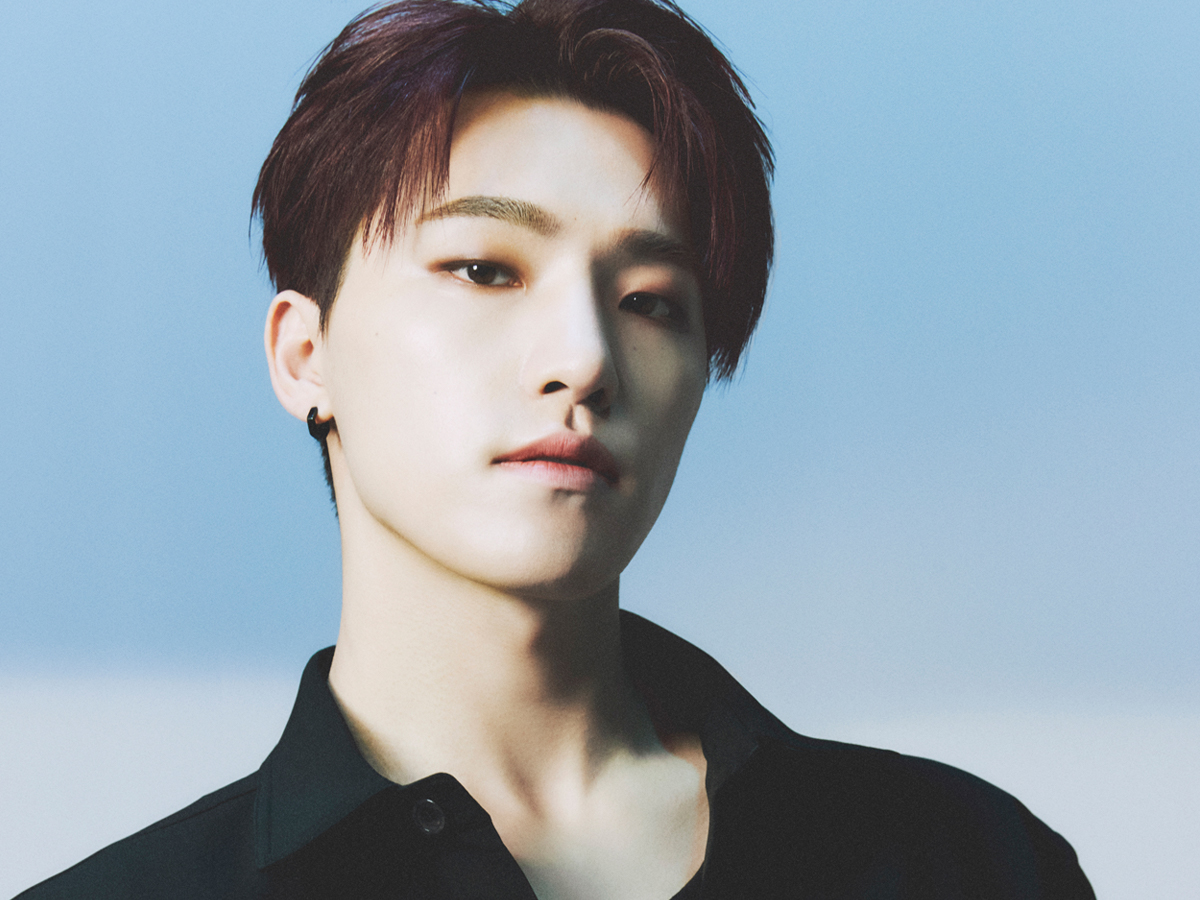
- VERNON: “I’m happy knowing who I am”2021.06.25
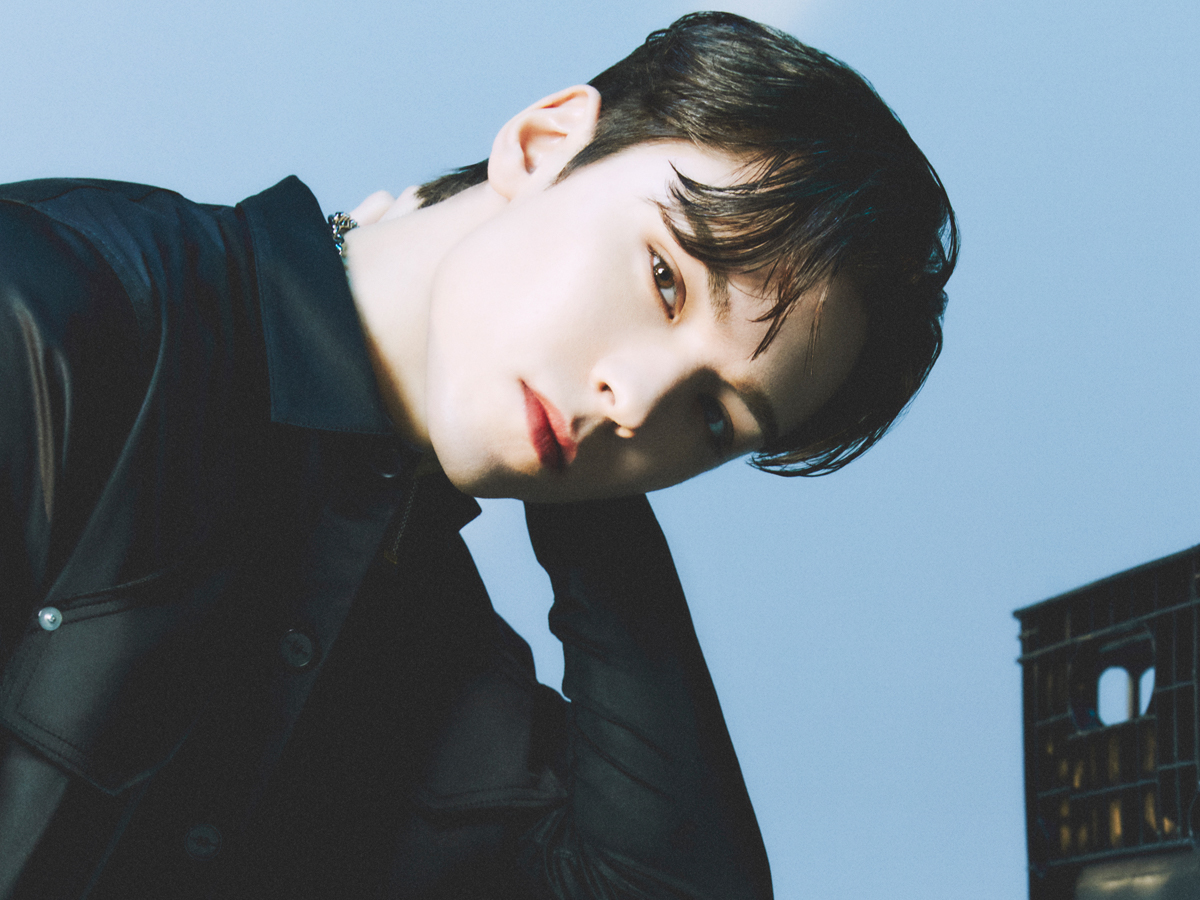
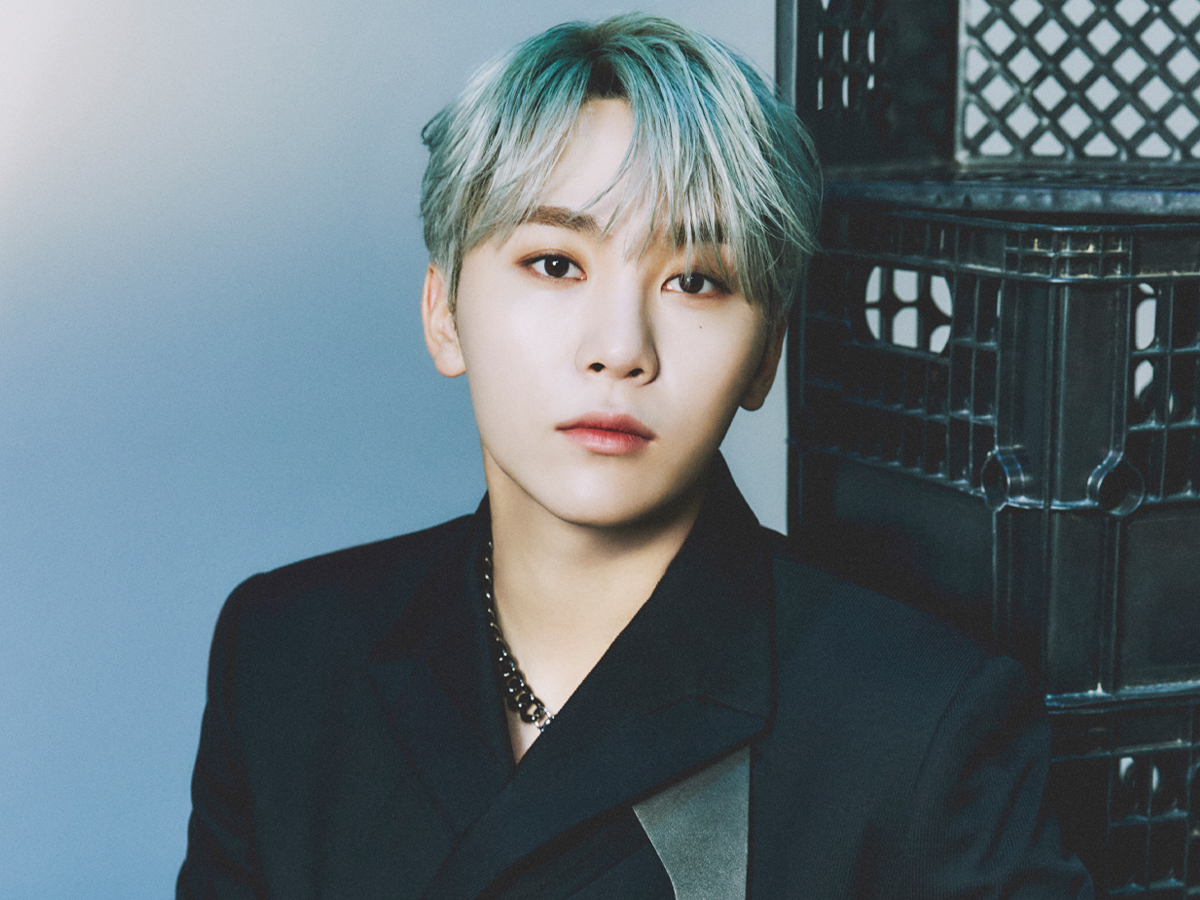
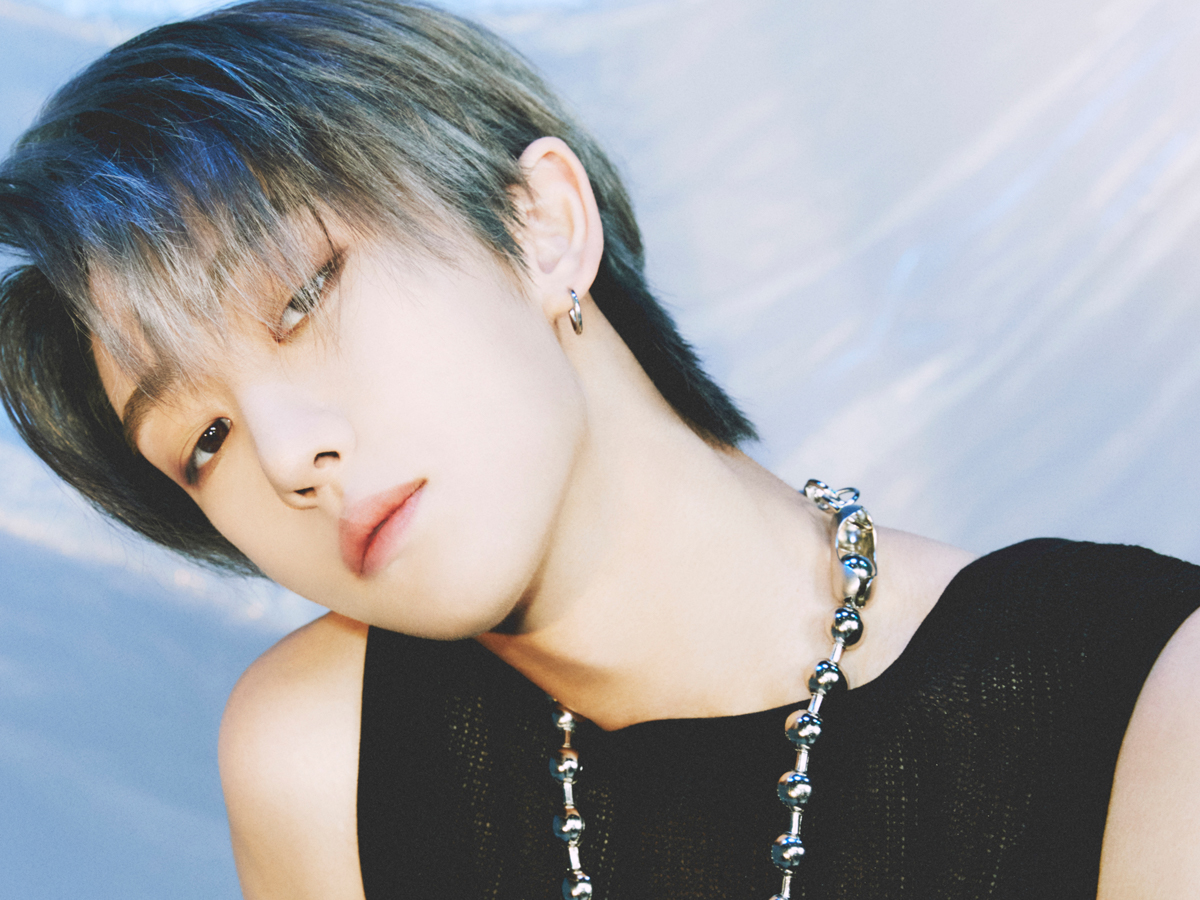
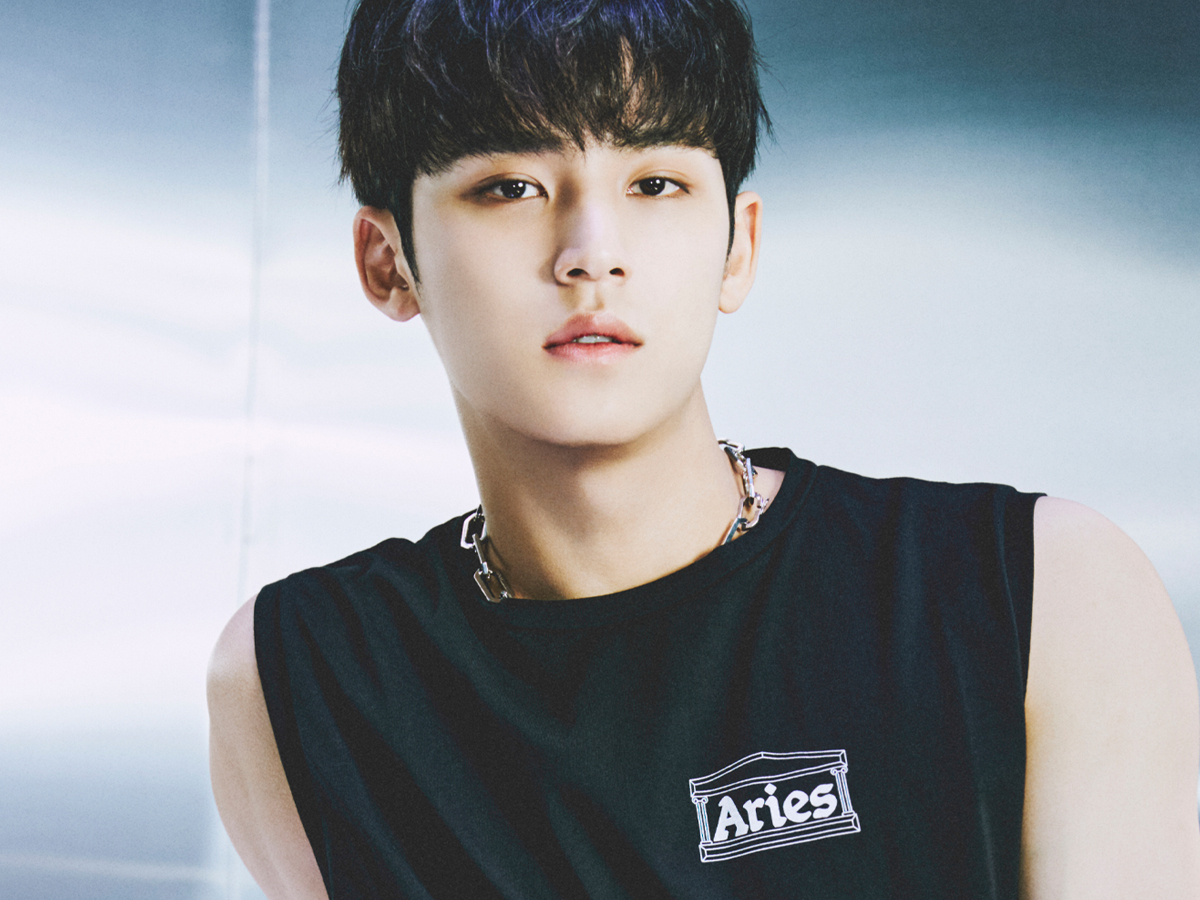
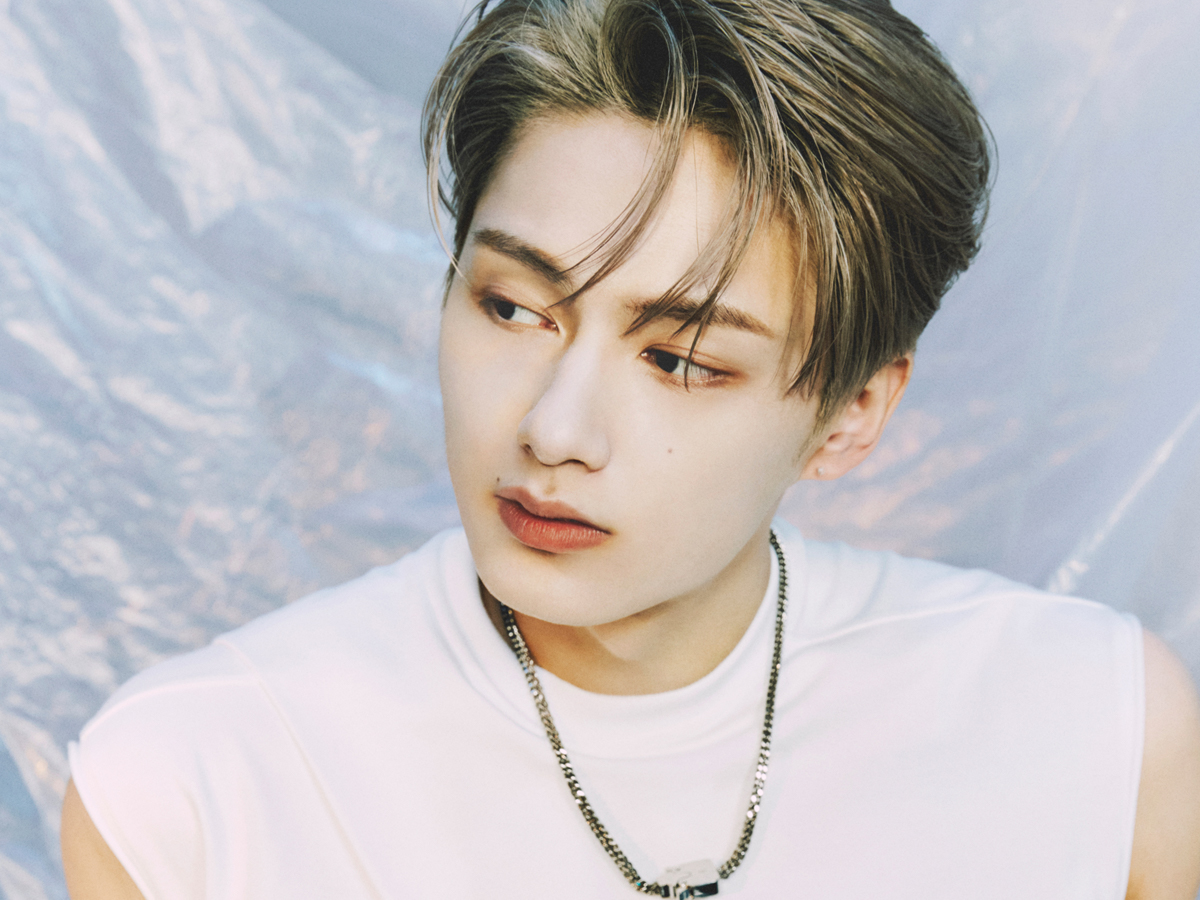
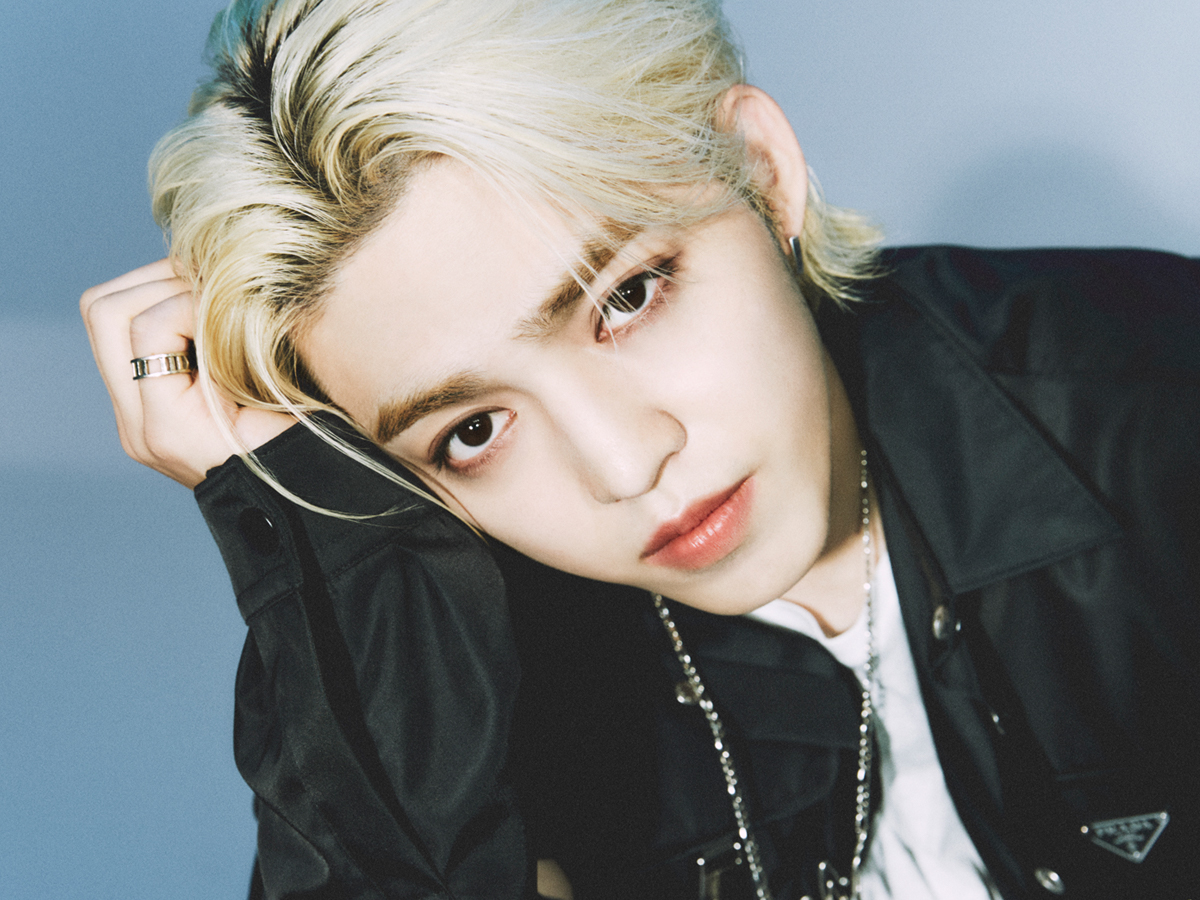
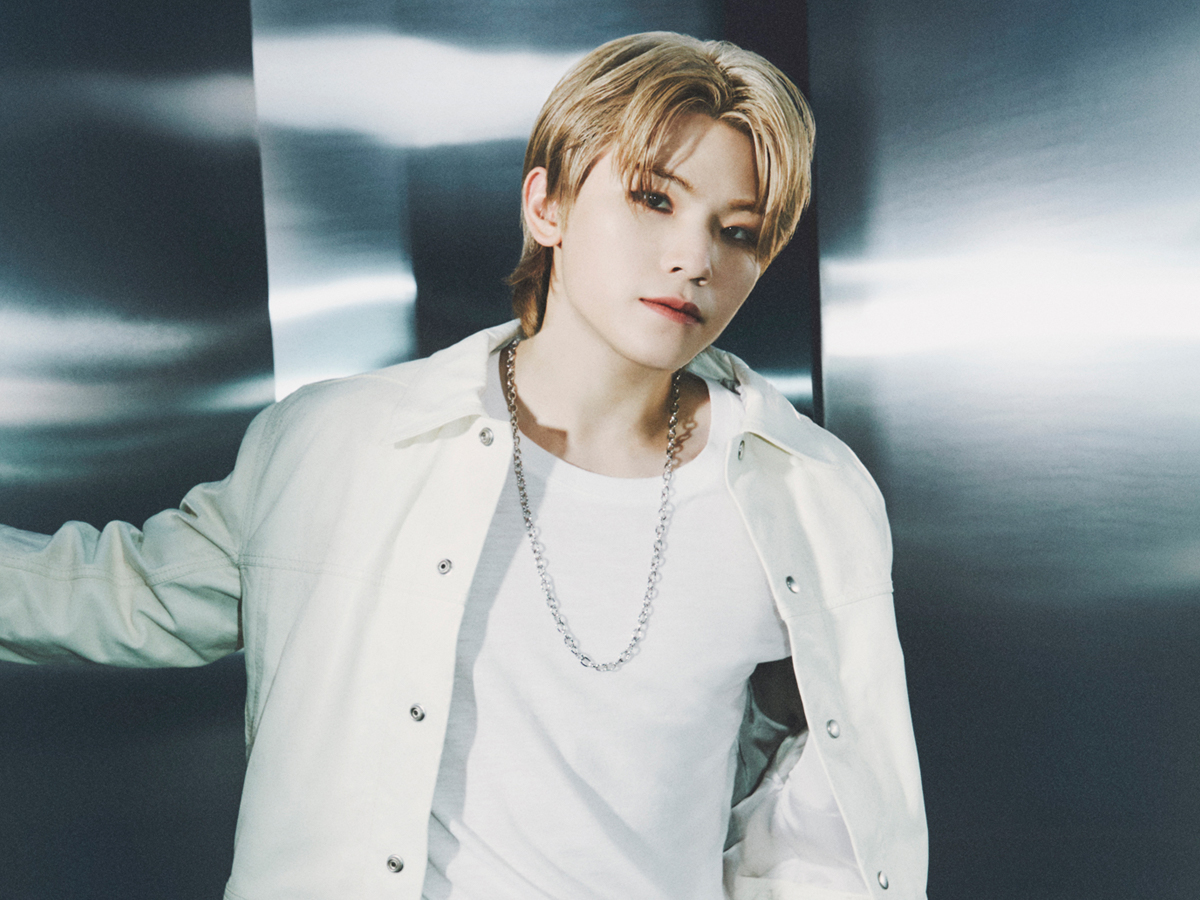
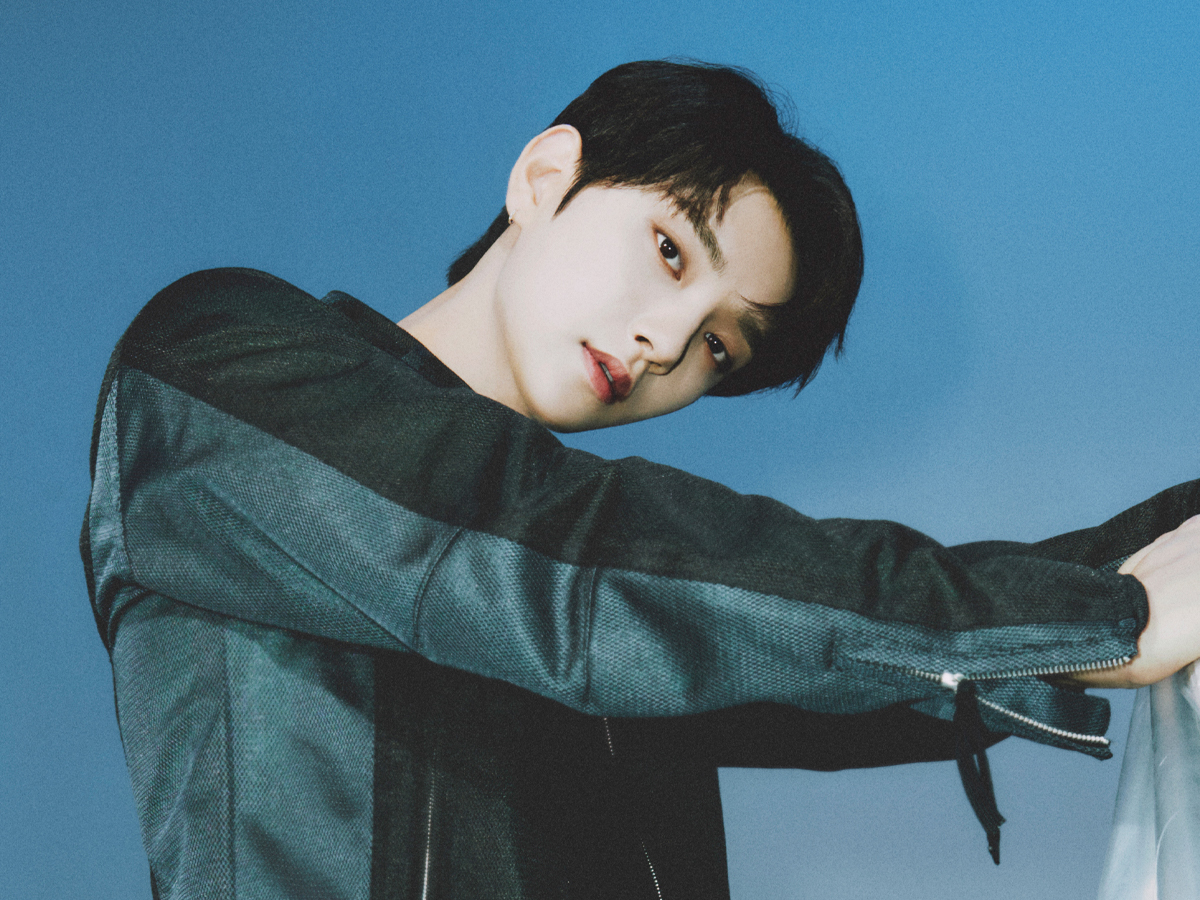
- SEVENTEEN Other Cuts2021.07.04
